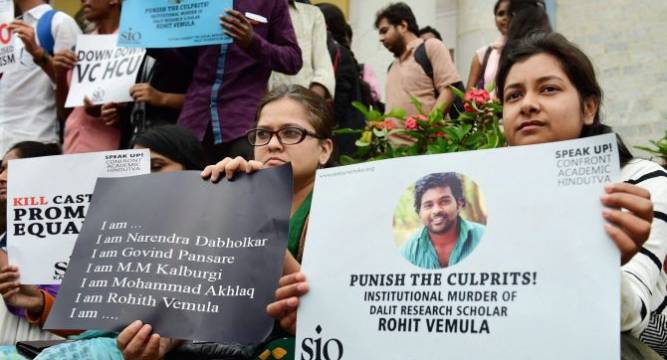BeyondHeadlines News Desk
New Delhi: Commemorating the first anniversary of Dalit leader, Rohith Vemula’s suicide, student organizations Birsa Ambedkar Phule Students Association (BAPSA), Students Islamic Organisation of India (SIO) and Youth Forum for Discussions and Welfare Activities (YFDA) issued a joint statement targeting the BJP led central government and RSS of launching an all out attack on universities.
Terming suicide of Rohith Vemula as institutional murder the disappearance of Najeeb Ahmad as “enforced”, the statement said that, “it reveal that agents of Brahmanical Fascism in universities have selected students from marginalized communities as their targets.”
The statement is being re-produced here verbatim:
The institutional murder of Rohith Vemula and the enforced disappearance of Najeeb Ahmad reveal that agents of Brahmanical Fascism in universities have selected students from marginalized communities as their targets. JNU right now is reeling under a conspiracy of saffronisation engineered by M. Jagdeesh Kumar and his Sanghi bosses. Students in JNU are resisting the attempts at crippling social inclusion in the admission and research programmes, but the threats to the life, liberty and dignity of personhood of students from marginalised communities show that Brahmanism is out to root out the very presence of Dalit and Muslim students from higher education.
Rohith Vemula suffered a sustained period of humiliation, which included eviction from hostel, termination of stipend allowances, exclusion from all public spaces of HCU, before he was forced to end his own life on January 17th, 2016. What was Rohith’s ‘crime’? He refused to accept Brahmanical hegemony in universities, he stood up to intimidation by the minions of fascism (ABVP), and he protested against the carceral state which sent Yakub Memon to the gallows. Rohith Vemula’s humiliation should remind us that there are entrenched histories of casteism even in premier universities. These histories of subjugating students hailing from deprived backgrounds include systematically discriminating against them at the time of entering university, alienating them within the university, or even erasing their existence itself, as is the case of Najeeb Ahmad.
Najeeb was forcibly disappeared from JNU after a near fatal attack upon him on the night of 14th October, 2016. Najeeb was attacked by members of the ABVP on a conspiratorial excuse. It was alleged that Najeeb had attacked an ABVP member for wearing a sacred thread on his wrist when the latter went to his room for a campaign in the upcoming elections in Mahi-Mandavi hostel. This allegation by the ABVP is clearly a fabrication, intended to imply that Najeeb himself caused the attack upon him to happen. Let us not forget, the action-reaction formula for justifying the genocide of Muslims has been popularised by Narendra Modi during his tenure as Chief Minister in Gujarat 2002.
While the institutional murder of Rohith is intended to intimidate Dalit students into silence and acceptance of Brahmanical dominance in universities, the enforced disappearance of Najeeb is intended to prevent Muslim students from aspiring to study in universities like JNU. Both Radhika Vemula and Fatima Nafees have to face the double trauma, of witnessing the death and disappearance of Rohith and Najeeb while also negotiating for justice with the same state which unleashed violence on them.
The model of ‘progressive politics’ as it exists in university campuses like JNU is based upon a perpetual appropriation of the struggles of Dalit-Bahujan-Adivasi students. This model of appropriation is led by parliamentary Left parties, wherein the struggle of marginalised identities for existence and emancipation is always converted into a convenient leftist vocabulary which leaves the existing structures of Brahmanical power unchallenged and does not question how anti-minority, upper caste prejudices are retained herein. But if we are to believe in the power of the resistance of the marginalized communities, then we will not let Rohith and Najeeb become mere emblems of victimhood. The life and struggle of Rohith teach us the meaning of radical solidarity and courage even in the face of moribund exclusion, while Najeeb’s brief presence in JNU should encourage other Muslim students to ensure that the vacuum left in JNU by disappearance does not become a permanent one. Let hundreds of Rohith and Najeeb arise to uphold the mantle of emancipation.
We need a new imagination of politics which can uphold the fight against Brahmanism, not as a progressive pretense, but as a reclamation of dignity and resistance by those who are historically marginalized.






















